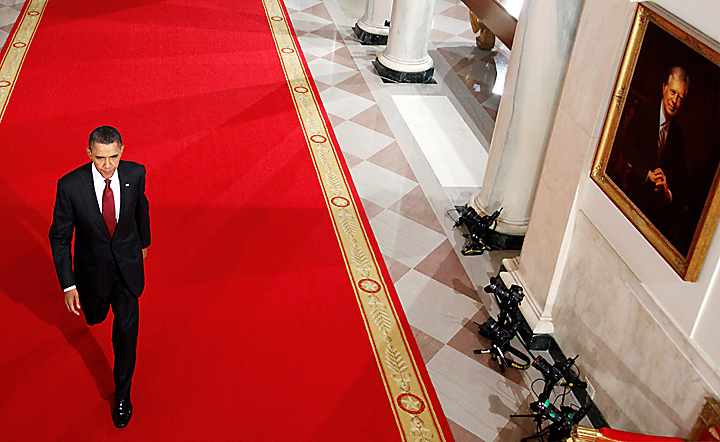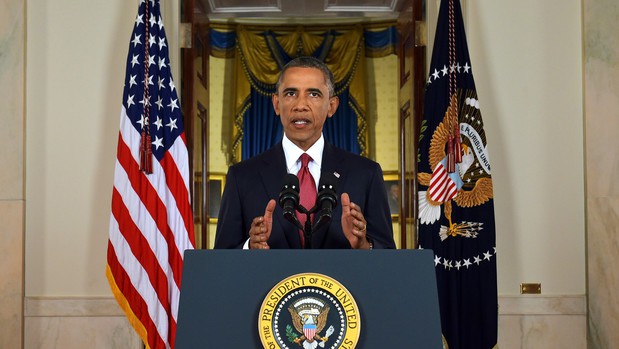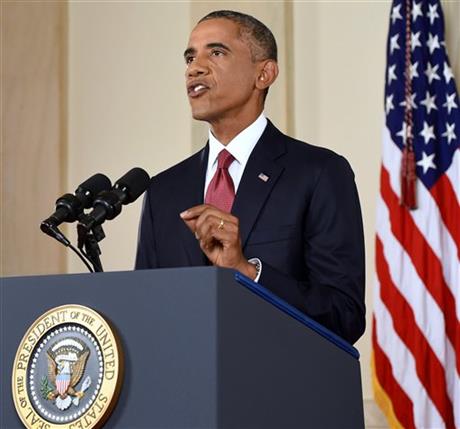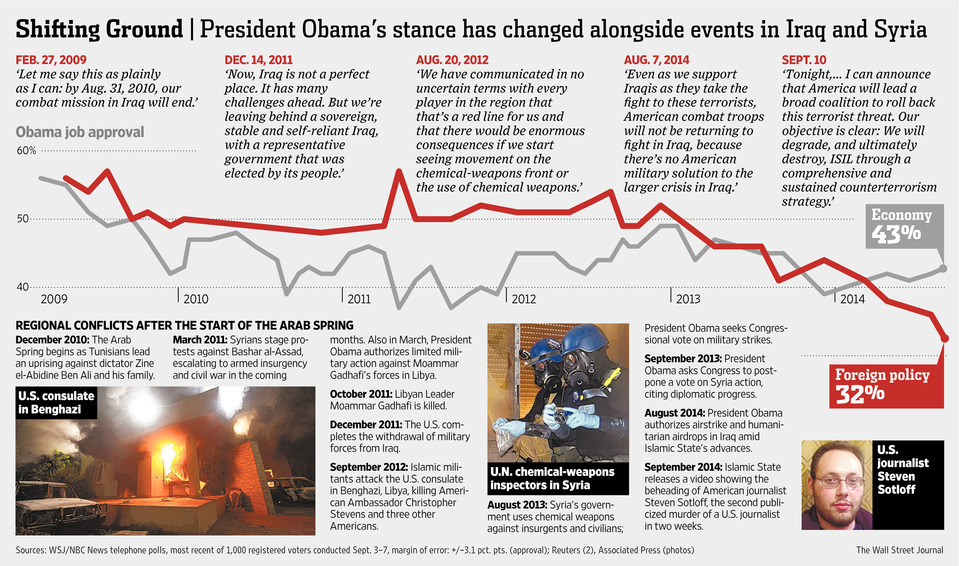From Airstrikes To Bombing Campaign, How The US Plans To "Degrade And Destroy" ISIS
President Barack Obama authorised the start of U.S. airstrikes in Syria and expanded a month-long bombing campaign in Iraq to "degrade and ultimately destroy" Islamic militants who recently beheaded two American journalists.
On the eve of the 13th anniversary of the 9/11 terror attacks, Obama authorised airstrikes inside Syria for the first time, as well as an expansion of strikes in Iraq to "degrade and ultimately destroy" ISIS militants in two volatile Middle East nations
President Barack Obama walks past a portrait of former President Jimmy Carter, right, in the Cross Hall of the White House in Washington before addressing the nation, Wednesday, 10 September 2014
Image via washtimes.comThe decisions considerably deepen U.S. military involvement in the Middle East. They also mark an acknowledgment by Mr. Obama that the intensity of the threat from the militant group Islamic State requires the type of long-term, open-ended conflict he has resisted since taking office—and which he campaigned for the White House saying he would avoid.
wsj.comIn asking Americans to support another military incursion in the Middle East, Obama said his strategy to combat Islamic State would be bolstered by a coalition of Arab and European nations
His plan builds on his authorization in August of airstrikes in Iraq to protect American personnel threatened by Islamic State and to provide humanitarian assistance to besieged Iraqis. Mr. Obama said the U.S. goal now is to help Iraqis reclaim large swaths of territory the group has rapidly overtaken in recent months since spilling over from its stronghold in neighboring Syria. His speech paves the way for the first U.S. strikes at the group's bases and havens in Syria.
In his nationally televised speech, the 44th President of the US said that anyone who threatened America will "find no safe haven"
"America will lead a broad coalition to roll back this terrorist threat," Mr. Obama said in remarks from the White House. "I will not hesitate to take action against ISIL in Syria, as well as Iraq. This is a core principle of my presidency: If you threaten America, you will find no safe haven."
wsj.comHe also announced that 475 US military personnel would be sent to Iraq but said they would not have a combat role. In a 15-minute speech shown at peak time in the US, President Obama vowed that America would lead "a broad coalition to roll back" IS. "Working with the Iraqi government, we will expand our efforts beyond protecting our own people and humanitarian missions, so that we're hitting Isil [Islamic State in Iraq and the Levant - the previous name for IS] targets as Iraqi forces go on the offense" he said.
In addition to launching airstrikes against the Islamic State militants in Syria, Obama pledged a new dose of support for moderate Syrian fighters also battling the extremist group
Taken together, the steps draw the U.S. closer toward the volatile Syrian civil war and open a new front for American efforts in the region. Saudi Arabia has offered to host a U.S.-run training facility for moderate Syrian rebels, U.S. and Arab officials said. The facility is expected to be able to handle as many as 10,000 fighters, but details are still being worked out, the officials said.
hindustantimes.comObama, whose middle name Hussein is derived from his Kenyan father, took pains to tell the Islamic world that the US was NOT against Islam and did not consider ISIS to represent Islam
President Barack Obama addresses the nation from the Cross Hall in the White House
Image via bloomberg.com"ISIS is not 'Islamic'. No religion condones the killing of innocents. And the vast majority of ISIS's victims have been Muslim. And ISIS is certainly not a state. It was formerly al-Qaida's affiliate in Iraq. It is recognized by no government, nor by the people it subjugates. ISIS is a terrorist organization, pure and simple," the US President said.
While Obama said that he has "the authority to address the threat from ISIS", he didn't elaborate on his claim of authority, as factually noted by Calvin Woodward for AP, to conduct a potentially years long campaign against the Islamic State group without new congressional approval
In a major reversal, Obama ordered the United States into a broad military campaign to “degrade and ultimately destroy” militants in two volatile Middle East nations, authorizing airstrikes inside Syria for the first time, as well as an expansion of strikes in Iraq.
Image via ap.orgBut administration officials briefing reporters before the speech said it is grounded in two authorizations passed by Congress, in 2001 and 2002. Obama himself criticized the 2001 authorization in the past and his administration called the 2002 resolution outdated. But now, both are being cited to support his action in Iraq and Syria.
The 2001 authorization supported President George W. Bush's war against al-Qaida and the then-Taliban government of Afghanistan. In a May 2013 speech, Obama said he wanted to "refine and ultimately repeal" it because "we may be drawn into more wars we don't need to fight." The Islamic State group was once tied to al-Qaida but has broken those links and now considers it a rival. The 2002 authorization supported the invasion of Iraq. Last year, Obama's national security adviser, Susan Rice, asked House Speaker John Boehner to repeal it, calling it "outdated."
In short, it's in dispute whether Obama has the authority he claims. The ability of presidents to launch sustained military action on their own is questioned whenever it happens, but it tends not to stay their hand. The administration does acknowledge it needs approval from Congress to conduct one part of its strategy — training and equipping Syrian opposition forces.
President Obama also gave no timetable for the new, US-led fight against what he described as "a terrorist organization" with members "unique in their brutality"
No set timeline for when the mission will be completed. But it won't happen overnight. Officials have said it could take a number of years to roll back the Islamic State organization, potentially extending the mission beyond the end of Obama's presidency in early 2017.



